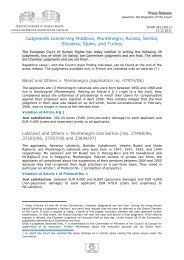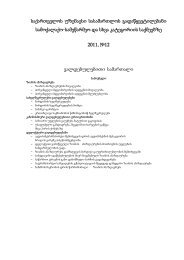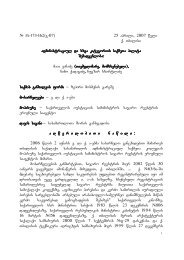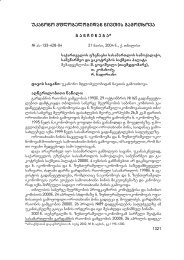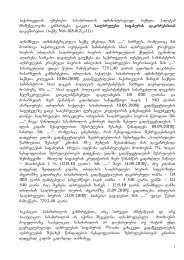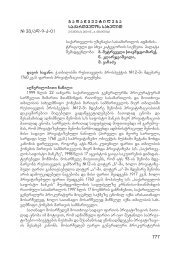#1(36)'13
#1(36)'13
#1(36)'13
Create successful ePaper yourself
Turn your PDF publications into a flip-book with our unique Google optimized e-Paper software.
marTlmsajuleba<br />
N1<br />
da<br />
kanoni<br />
RIGHT TO HEALTHCARE AND<br />
ACCESSIBILITY TO MEDICAL<br />
SERVICE – INDIVIDUAL AND<br />
COLLECTIVE RIGHTS OF<br />
A PATIENT<br />
NATIA TAMAZASHVILI<br />
Caucasus University, Law School Master Student<br />
Life and health of individuals – these are the concepts that we get information<br />
about every day. Most often the public speaks about the violated rights of a patient.<br />
However, only some of them know what legal mechanisms are there to<br />
protect their rights.<br />
It is interesting who is responsible for the violated right of a patient and what<br />
role does the state play in that case, particularly, how does it regulate these issues<br />
from a legal point of view and how it exercises control.<br />
Each of us at a certain stage of our lives becomes patient. According to the<br />
Georgian legislation, patient is “any person, who regardless of the health state,<br />
uses, needs or intends to use the healthcare system service”. As a rule, a person<br />
with a status of the patient establishes relations with a doctor, who carries out<br />
medical activity. Definition of the medical activity is as follows: “professional<br />
activity of a person educated in medicine with relevant skills and practical experience<br />
whose purpose is to promote, keep and restore health of individuals, to<br />
relieve them from pain in accordance with the recognized medical standards and<br />
ethics norms as well as traditions” (The Law of Georgia “On Medical Activity”,<br />
Article 5/a).<br />
In order to implement the above-mentioned there is a need of existence of<br />
those necessary preconditions that on their part will have a positive influence for<br />
the defence of these rights during the relations between a patient and a doctor.<br />
It is important to underline the circumstance that as a rule a patient goes to<br />
visit a doctor with a certain problem. In this case, the doctor shall have an obligation<br />
to fulfill his/her duties in good faith in order to prevent irremediable outcomes<br />
in most cases.<br />
We have elaborated several recommendations with the consideration of the<br />
topic discussed above which are as follows:<br />
142




